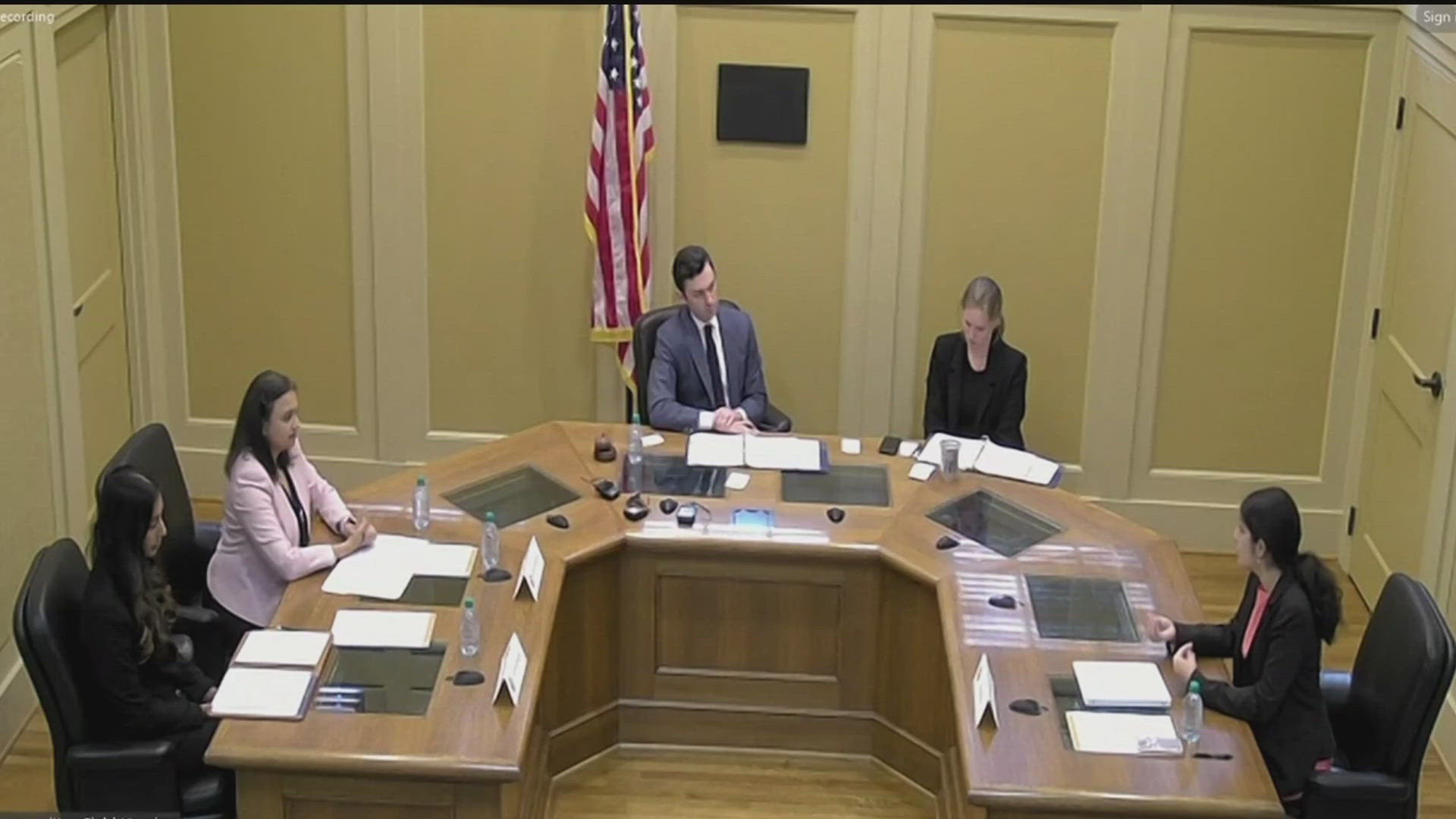GEORGIA, USA — A trio of doctors testified as part of a special hearing Tuesday, weighing in on the impacts of Georgia's controversial six-week abortion ban, which has been in effect since the overturn of the landmark Roe v. Wade case.
"It's important for the public to hear directly from doctors, OB-GYNs in Georgia about how Georgia's extreme six-week abortion ban puts women's lives at risk," Sen. Jon Ossoff said.
Ossoff led the hearing for his Human Rights Subcommittee, which featured testimonies from an OB-GYN, a maternal-fetal medicine specialist, and a first-year medical resident.
The physicians shared patient stories as part of the hearing, re-capping women who have been negatively impacted by Georgia's so-called 'heartbeat law.' Dr. Nisha Verma spoke about the uncertainty. She said many doctors feel that when and under what parameters can they help patients in crisis.
"I've had patients that are turned away even though they are in the process of miscarrying because that cardiac activity is still present, and they're told 'you have to start bleeding more,' you have to get sicker,'" said Verma said.
The doctors also shared their concerns that the restrictions will worsen the state's shortage of OB-GYN doctors, further limiting access to prenatal care. Such results, the doctors shared, could subsequently exacerbate Georgia's maternal mortality rate, which is among the worst in the country.
During the hearing, Aisvarya Panakam, originally from Georgia and now a first-year resident, stated that current state law influenced her decision not to pursue her residency in her home state. She cited the difficulty in receiving the training needed had she stayed in Georgia; ironically, during her out-of-state residency, Panakam stated that she attended to a patient who had traveled from Georgia seeking medical options unavailable in her community due to the state's ban.
"Even though it was well understood that her fetus would die either in utero or soon after soon after delivery, she was unable to receive an abortion because her fetus still had a heartbeat,” Dr. Panakam testified. "Georgia’s abortion ban jeopardized her life by delaying her access to care. She survived. Others have not.”
As the physicians recounted their experiences since the state's six-week ban, they repeatedly pointed to the law's "narrow" and "extreme" exceptions.
"The Georgia abortion ban limits the ability of myself and my colleagues to provide evidence-based care and counseling and significantly puts the well-being and lives of our patients at unnecessary risk," Dr. Suchitra Chandrasekaran, a maternal-fetal medicine specialist, testified.
Balancing the care of mom and baby amid complex, high-risk pregnancies or miscarriages, the physicians emphasized, is much more nuanced than the law's language.
"Putting laws on a system that is extremely volatile and changeable, and not identifiable as 'yes, no, black, white, this is it,' is only going to lead to tragedy."
"I thought it was very powerful to hear the stories that these doctors told about patients they've seen who've been unable to get the care they need to stay healthy during pregnancy," Ossoff said after the hearing.
Yet, when asked about doctors' testimonies, pro-life advocate Suzanne Guy questioned the medical necessity of abortions.
"I believe that people who have a medical degree can do better," Guy, who advocated for the passage of the law, said. "And fight for mother and child and protect both mother and child."
More on Georgia's Heartbeat Bill
Republicans and Democrats fought bitterly over the 2019 heartbeat bill – which made abortion illegal after an in-utero embryo produces a heartbeat.
The law, signed in 2019, did not go into effect until Roe v. Wade was overturned in 2022.
Once the law was set to go into effect, a Fulton County judge ruled to overturn the state’s ban on abortion.
Judge Robert C.I. McBurney ruled in November 2022 that the ban was invalid because it violated the U.S. Constitution and Supreme Court precedent when it became law.
But, the Georgia Supreme Court decided to keep the law in effect in October 2023.
The two political parties in the Peach State continue to have opposing views as abortion rights remain a national controversy, with the expectation the issue will play a significant role in the 2024 Presidential election.
Georgia Speaker of the House Jon Burns recently spoke with 11Alive's Zach Merchant, in which he stated that he "supports the right to life."
"I believe we've struck a balance here that is, you know -- the heartbeat bill is not satisfactory for those who believe that life begins at the point of conception, we understand that. I understand that. But we also know there are other folks that think abortion could occur at any time during pregnancy, even up to the point of birth. And I certainly very vehemently disagree with that," Burns previously said.
Other reproductive issues have also taken the stage for a legal battle in the Peach State and on the federal level, including In-vitro fertilization, IVF, and the abortion pill mifepristone.

